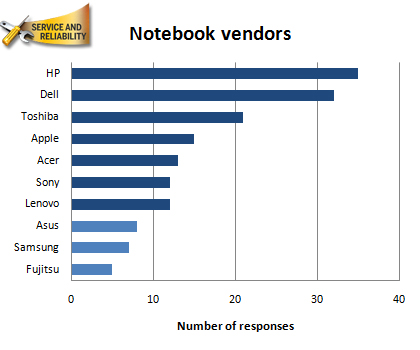Service & Reliability Survey 2010: Notebooks

NOTEBOOKS
Which vendors do you use for notebooks?
We received information on notebooks from 65 respondents. On average, the organisations they worked for used between two and three (2.5) notebook vendors each, giving a total of 160 responses. HP and Dell dominate the scene, followed by Toshiba:

Which operating systems are installed on your notebooks?
As with desktop PCs, Windows XP is the most prevalent operating system in the survey: 15 respondents (27 percent) reported XP on 'all' of their notebooks, while 22 (39 percent) ran it on 'many'.
Windows Vista is slightly more visible in the notebook survey than it was on desktops, and four times as many respondents reported Windows 7 on 'all' of their notebooks compared to desktops. This makes sense if notebooks are generally replaced on a shorter cycle than desktops.
Which notebook form factors are deployed?
Netbooks may be selling like hot cakes in consumer-land, but they're a yet-to-be-acquired taste among the businesses in our survey. The same goes for more expensive and functional — but similarly lightweight — ultraportables. The notebook population in our survey consists largely of mainstream (3-4kg) systems, with a side order of thin-and-light (2-3kg) and desktop replacement (>4kg) machines.
What are the points of failure on your notebooks?
Notebooks generally receive more physical punishment than desktops, and are more likely to be repeatedly turned on and off, all of which means there's plenty of chances for things to go wrong.
We asked about 15 points of failure and found that the battery, software and drivers, the hard disk and the AC adapter headed the list.
Other components that rated at least one mention in the 'very common' failure category were the screen hinge, power input, cooling system and wireless (Wi-Fi and/or Bluetooth):
Less often seen as points of notebook failure — at least in our survey — were the keyboard, screen, slots, ports, case, motherboard (CPU, RAM, chipset) and solid-state disk (SSD):
How do you rate your notebook vendor's technical support?
The survey returned more than 10 responses on technical support for seven notebook vendors: HP, Dell, Toshiba, Apple, Acer, Sony and Lenovo. As with desktop PCs, most responses cluster around the 'average' and 'good' categories, with the left-hand tail extending to 'abysmal' for five vendors — HP, Dell, Apple, Acer and Sony:
Other vendors surveyed: ASUS, Samsung, Fujitsu
How do you rate the reliability of your notebooks?
Our respondents' evaluation of notebook reliability should be relatively encouraging for vendors. The distributions for HP, Dell, Sony and Lenovo all have 'good' as the modal category. Toshiba and Acer slip into 'average' (although sample sizes are small), while most of the Apple customers in our survey rate their MacBooks' reliability highly:
Other vendors surveyed: ASUS, Samsung, Fujitsu
How likely are you to repurchase notebooks from your current vendor?
If you're satisfied with a vendor's service and reliability record, you're likely to reward the company with further custom. For HP, Dell and Toshiba the picture looks pretty healthy — that's why they are leading notebook vendors, after all. Even so, the tail of 'possibly', 'unlikely' and (Toshiba excepted) 'no chance' responses show that at least some customers have issues.
Apple is a special case when it comes to repurchase intentions, as customers have no alternative supplier if they want to remain on the Mac OS X platform.
Other vendors surveyed: ASUS, Samsung, Fujitsu
How does your notebook vendor's environmental policy affect your buying decision?
Most technology companies strive to present themselves as good environmental citizens. Here is HP's policy, for example. Of course we applaud such efforts, but do they have traction at the sharp end of the buying cycle?
Our survey, in which only two respondents (one HP customer and one Toshiba customer) rated their notebook vendor's environmental policy as 'paramount', suggests not. However, over time, we expect green issues to become increasingly important to buyers.
Other vendors surveyed: ASUS, Samsung, Fujitsu